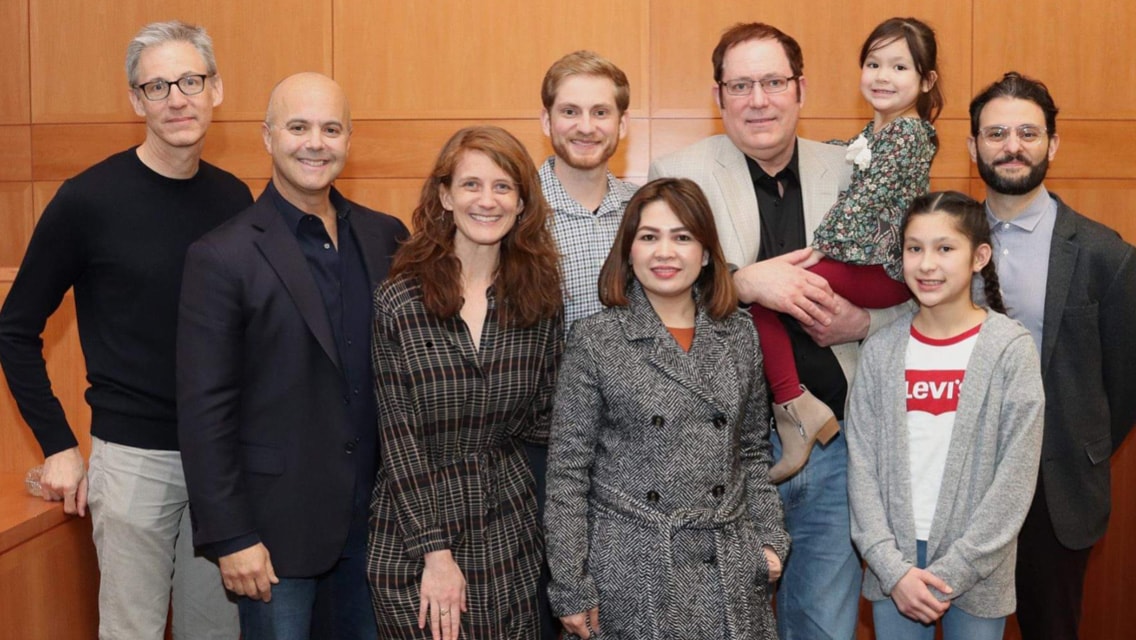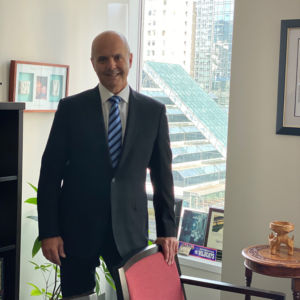
Richard Hanus with producer, director, the Keathleys and cast
Richard Hanus never thought he’d be a silent star of a major New York play.
But the veteran Chicago immigration attorney is just that as the play “The Courtroom” began its latest run in the Big Apple on Oct. 24, and with the next production slated for December 9. The play is based on a full transcript of court proceedings of trials featuring Hanus and his clients, Elizabeth and John Keathley of Bloomington, Ill. Hanus was recently played by Tony nominated actor Thomas Sadoski, whose credits include The Newsroom and Life in Pieces. The New York Times has called The Courtroom “one of the most heart-gripping shows of the year”, including it in its 2019, year end Best-Of list.
“It is otherworldly to say the least,” Hanus said. “I’m in awe of the process by which I was able to be in a position to help this family. Then for my clients to win and eventually become the subject of a public presentation is completely humbling and dreamlike.”

Jeffrey Chase, Richard Hanus, Lee Sunday Evans, Director, Adam Frank, Elizabeth and John Keathley and family, Arian Moayed,
In 2004, Elizabeth Keathley, an immigrant from the Philippines who was married to John, came to the U.S. on a K3 Visa. She visited a DMV in Chicago in 2006 to receive a driver’s license and inadvertently registered to vote. She later was mailed a voter registration card and subsequently voted, which led to her possibly being deported. The case dragged on for eight years, beginning in Immigration Court and winding its way up to the 7th U.S. Circuit Court of Appeals. After lively oral arguments, the Court of Appeals decided in favor of Keathley and remanded the case back to the lower court. The Court approved Keathley for permanent residence after deciding she didn’t intentionally do anything wrong when she registered to vote, according to a 2014 Chicago Tribune report.

Linda Powell (previously played Hanus), Richard Hanus, Kathleen Chalfant (plays Judge Easterbrook)
Flash forward to the summer of 2018, when Hanus received a call from Madelyn Murphy, a production associate at Waterwell, a civic-minded theater company in New York. Murphy was looking for transcripts regarding deportation cases that could be a great fit for a play. Hanus a few days later, after receiving his clients’ approval, sent her the transcript from the Keathley case. Soonafter, Hanus received a call from Arian Moayed, Co-Founder of Waterwell and an actor on the hit series Succession, who said he was enthralled with the transcript and wanted to create a play about it.
“Within a month or two, he had reduced the transcript to something the general public could consume, and by January, he’s got a play put together,” Hanus said of the first production, which appeared off Broadway this past winter, featuring Tony Award winner Ruthie Ann Miles as Immigration Judge Craig Zerbe. Hanus’ role has also been played by Linda Powell, who has had numerous appearances on “Law and Order, SVU” and “Chicago Fire.” Linda is also the daughter of Colin Powell.
“I am completely taken aback by the fact that someone used this transcript for art,” Hanus said.
Hanus has had his own Downtown-based practice – The Law Offices of Richard Hanus – for 28 years. He said he was drawn to immigration law because of the human element and the impact he could have on people’s lives.
“My wiring was such where I wanted to work in a position where my impact would be significant and personal,” said Hanus, a graduate of Northwestern University and University of Illinois College of Law. “Learning about immigration law, I knew this was a field I could thrive in.”

Richard Hanus
Hanus said he gets his wiring from his parents. His father escaped from Auschwitz; his mother was liberated from the same concentration camp. The couple met in Europe after the war, married, and eventually had four children, Richard the youngest. All four siblings have been successful. “My parents’ survival had to do with good fortune and luck, but just as much as innate survival skills,” Hanus said. “I am grateful to have gotten just a bit of the kind of wiring that helped my parents survive.”
Hanus said he sees numerous clients like the Keathleys. He said the play is a good representation of what’s happening in today’s society and political climate as well.
“It’s a very big issue, and our current climate has a lot of people and companies scared and uncertain about the future,” Hanus said.
